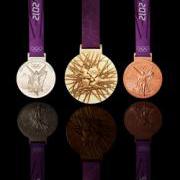
Never afraid of a challenge, before the start of the London 2012 Games we issued predictions for the total medal count for the top 20 countries. They were based on a mathematical model that took account of a country's GDP and population, its performance in 2008 and the home advantage bestowed on Great Britain and also China, who hosted the Games in 2008 (see Mapping the medals).
So how did we do? The first thing to notice is that, despite team GB's gold rush (which put it in third place on the official London 2012 Olympic medal table based on gold medals won), it actually performed worse in terms of total medals won than we had predicted, ending up in fourth place rather than in second — despite the home advantage, the likes of Russia and China are hard to beat. Hungary makes a surprising appearance, entering in 14th place while we didn't have it down as making the top twenty at all. Iran also just about squeezed in, tying with Jamaica in 20th place. And Kenya, which we had down to come 18th, narrowly missed the top twenty, coming in as 21st. Other than that all but three countries from our original list stayed within three ranks of our predictions. Japan and the Netherlands both performed better than we had predicted, Japan coming in as 6th rather than 11th and the Netherlands at 11th rather than 16th. And Belarus gave a disappointing performance against our mathematical benchmark, coming in as 16th rather than 11th.
So we won't be giving up the day job in favour of life on the sports pundit circuit anytime soon! We've handed the results to our sporting stats experts and will bring you a more detailed analysis shortly, but meanwhile here's an overview of the actual outcomes as a table and on our interactive map.
|
|
External links
The BBC's More or Less team conducted a similar statistical prediction of what countries might be expected to win in the way of medals with the help of the Kellogg School of Management at Northwestern University; here is their analysis of the results.
The Guardian teamed up with the Royal Statistical Society and four academics at Imperial College London to produce very interesting alternative medal tables for the 2012 Games, taking into account factors including GDP, population and team size. You can see their final alternative medal table winners here.
The medal map was created by our sister-site Plus, the free online mathematics magazine. You can read a detailed account of the mathematics behind these predictions in our article Mapping the Medals.

